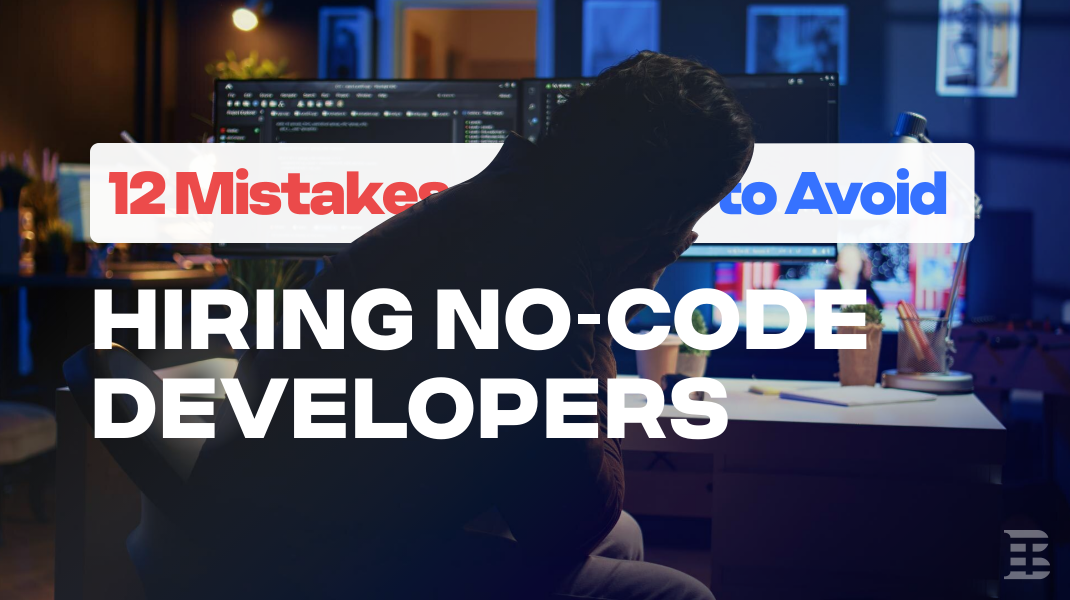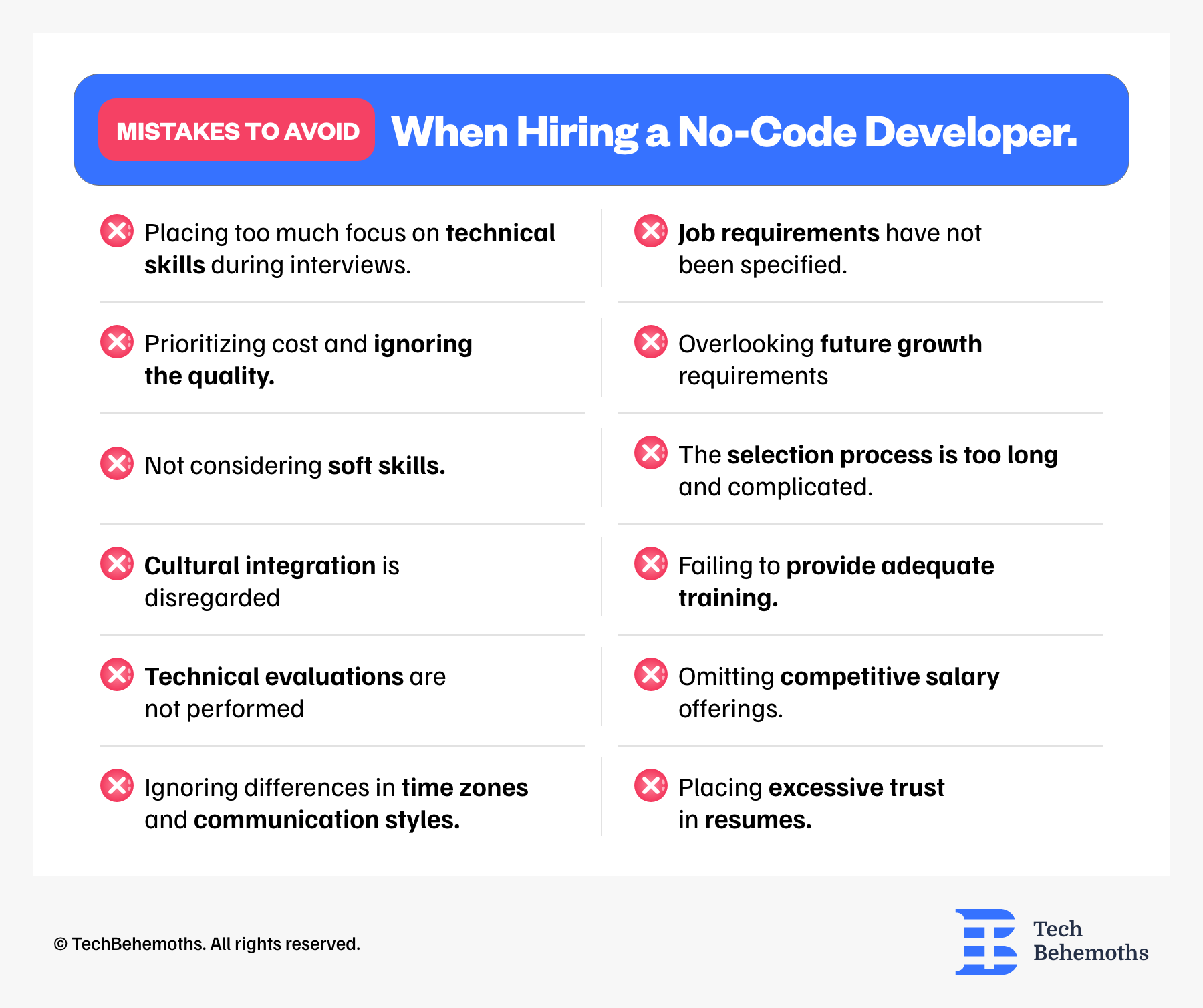12 Mistakes to Avoid When Hiring No-Code Developers

Summary
No-Code Development is a growing tech industry and is used by a larger talent pool, including people without coding skills. Hiring Developers from this domain has some challenges that may put at risk the project’s success by creating money and time waste, frustration, and high employee turnover.
The mistakes that users and the company often make when hiring a No-Code Developer include: Trusting only in resumes, not conducting a tech interview, not specifying job requirements, omitting differences in time zones, and soft skills of a candidate are ignored.
Avoiding these errors could be done by creating real-life exercises that evaluate the soft and technical abilities and analyze their interaction with the team. Your project will only benefit and flourish from choosing the ideal No-Code Developer.
No-Code Development represents a relatively new type of Software Development that requires few or no technical skills to create an app. It is useful for users who do not have the required programming abilities to make the desired application. These Developers often use No-Code platforms.
More than 65% of app development will be powered by no-code or low-code platforms by 2025. Its popularity is rising due to the possibility of rapidly and efficiently creating websites with only basic knowledge. Despite the remarkable perks this Development branch offers, there are mistakes that people make when hiring a No-Code Developer.
This article explains the often issues users experience in the process of employing No-Code Developers and how to avoid them.
Looking for an No-Code Development Company?
Check our list of top No-Code Development companies worldwide
What Are the 12 Common Mistakes to Avoid When Hiring No-Code Developers?
Here are the most common mistakes to avoid:
- Placing too much focus on technical skills during interviews.
- Job requirements have not been specified.
- Prioritizing cost and ignoring the quality.
- Overlooking future growth requirements
- Not considering soft skills.
- The selection process is too long and complicated.
- Cultural integration is disregarded
- Failing to provide adequate training.
- Technical evaluations are not performed
- Omitting competitive salary offerings.
- Ignoring differences in time zones and communication styles.
- Placing excessive trust in resumes.
We will explore these and other points further.

Trusting Too Much In Resumes
When many candidates want to get your job offer, it is difficult to select meticulously from all of them. It can become a long and tiring process, but still relying only on resumes can bring consequences. On resumes, Developers show their experience and technical skills, but not their communication abilities and teamwork.
Between a Developer with a great tech stack but not great resume writing abilities compared to an IT expert with lower tech skills but good writing skills, there is a big competition for a job offer that relies only on resumes. Bias and misinterpretation can appear in this situation. This is why trusting only CVs in the hiring process has a drawback that puts at risk the project’s future.
What should you do instead?
You can evaluate their skills by using coding tests, collaborative interviews, and soft-skills analysis.
Too Much Focus on Tech Skills Interview
Prioritizing technical interviews is one of the biggest mistakes companies make. Tech skills are important for a Developer job, but for No-Code Development, that doesn’t require many abilities in coding abilities. There are more important features, for example: collaboration with team members, problem-solving, stress situations, and communication skills.
Stack Overflow has a study about the whiteboard coding interviews and how useless they are for analyzing the tech skills of a candidate.
What should you do instead?
Instead of this, you could give homework that is close to real work, or pair with someone to observe the teamwork and create a real-life scenario to see their behaviour. This investment will help you find the right people for your project’s success.
Job Requirements Have Not Been Specified
Not clarifying the job is a grave mistake to make when hiring a No-Code Developer, because it can lead to employing someone who is not right for this job. It can also create confusion, wasted time, and unmet assumptions. Among the responsibilities of the No-Code Developer are the following: Web Designer, App Developer, and Solutions Architect.
Make sure that your job description is not too generic, it has a clear tech stack, and the project’s goals are explained.
What should you do instead?
Before hiring a specialist, specify what skills, experience, and level of education will be required for the job. At the interview, find out if the candidates can match these criteria. Additionally, you can create a folder that contains the tools used for the team, timelines, required technologies, and other useful information for this job.
Prioritizing Cost and Ignoring the Quality
Choosing to focus on the budget and not the quality is another big fault that can put at risk the future success of the project. It can cause poor quality of the codes, running behind schedule, and redoing work, which can drive up future costs. The delayed schedule may influence the work’s results and often create more spending to resolve these issues.
What should you do instead?
In this case, you should look for Developers who not only check with the company’s criteria, tech skills, and culture but also your budget. The costs should be created based on the Developer’s IT abilities, portfolio, experience, and education level. It is also crucial to create a balance between budget and quality to make sure your project’s future is successful.

Overlooking Future Growth Requirements
Preparing for future growth should be considered for every project. Employing Developers for urgent needs without considering scalability can bring bad consequences. For example, it can shut down when your app is gaining popularity. Scalability considerations should include: future tech requirements, hiring tech experts who can adapt, and opting for flexible & building-block design.
Usually, No-Code platforms are used to create simple and fast apps that aren’t prepared for high-complexity processes.
What should you do instead?
There are ways to scale your project; for example, you should improve your database network, update content distribution, track performance, etc.
Soft Skills Are Not Considered
More than 90% of hiring managers think that soft skills matter the same or even more than tech skills, according to LinkedIn’s Global Talent Trends. The following abilities are called Soft Skills:
- Adaptability
- Verbal proficiency
- Critical thinking
- Problem-solving skills
- Teamwork
What should you do instead?
During the interview, use the opportunity to study the Developer’s soft skills to determine whether they can meet the job requirements. To avoid this mistake, in addition, you can create various exercises or trial periods to evaluate both tech and soft skills.
The Selection Procedure Is Too Long And Complex
The average selection procedure can take up to a few weeks, which can lead to frustration and can turn off many potential candidates. It is a big possibility to miss hiring the best candidate, but also wasting time and money. If the process of selection is too long may also create a bad impression of the company and rise the procent of the candidate turnover.
What should you do instead?
To avoid missing the right candidate, you should consider the following strategies:
- Define the project goal and the Developer’s role in the project before starting the hiring process to attract candidates with the right abilities.
- Maintain the process transparent and efficient: Conduct comprehensive evaluations without compromising the speed of recruitment.
- Ask specific tech and real-life questions about no-code tools and solving problems, rather than generic topics.
Making the hiring process faster and more efficient helps you find skilled No-Code Developers quickly and doesn’t waste excessive time or funds.
Cultural Integration is Disregarded
Every company has its own culture and philosophy. It defines the project’s goal and trajectory. It may be a concern that the candidate can’t fit the company’s culture, even though he has the needed IT abilities.
What should you do instead?
You can easily see during the interview if a candidate follows the values, communication skills, and the work ecosystem that your firm provides. Developers who can agree with the culture your company shares can bring a positive influence on your project’s growth and success.
Technical Evaluations Are Not Performed
Another mistake when hiring a No-Code Developer is not conducting a tech assessment. For this type of job is important to evaluate the candidate’s technical skills to make sure that the job requirements will be fulfilled.
What should you do instead?
To perform an analysis of the Developer’s abilities, you can try the following tactics:
- Create coding challenges
- Programming languages exercises
- Whiteboarding problems
Not conducting a technical evaluation can lead to hiring underqualified candidates, creating a product of low quality, data security risks, and delayed deadlines. It can also lead to budget and time wasting for you to find and hire a skilled No-Code Developer.
Competitive Salaries Are Omitted
Competitive salaries are a good way to attract top No-Code Developers for your job. There is a high demand for Developers; thus, candidates have many job offers. Not offering competitive salaries for Developers can lead to difficulty in finding talent, losing candidates who look for jobs with better pay, and decreased motivation.
What should you do instead?
You should remunerate Developers according to their experience and abilities. To be more captivating for candidates, you can study the local fees for No-Code services and offer additional benefits. For example, holiday bonuses, remote work possibilities, annual training, and professional improvement options.
Ignoring the Differences in Time Zones And Communication Styles
Hiring Developers from other cities or even countries may be budget-friendly, but if the working hours have a big difference, the collaborations can become difficult. Online meetings can’t deliver the same productivity as offline ones, and it is hard to track developers’ work from such a great distance. In addition to this can also appear delayed updates, meetings at inconvenient hours, and job requirements misunderstood.
No-Code Development doesn’t need much monitoring of their work, so it can be easily done remotely. Despite that, work-related meetings are a must for progress tracking, and different time zones can be an issue.
What should you do instead?
A solution is to employ Developers from your location or a place with similar working hours to your company. Freelancers who work remotely have the flexibility to work whenever is comfortable for them and their employer. You can hire a freelancer and have online meetings using tools like Zoom or Google Meet.
Training Is Not Provided
For newly hired Developers, it is crucial to be provided with training from the hiring company. It is a big mistake to put hard tasks on freshly hired Developers without support and training, because it can lead to continuous staff changes. Not offering training programs can also cause
- Reduced efficiency
- Decreased motivation of No-Code Developers
- Significant candidate departures.
Not providing training could also facilitate new employees to make more mistakes. These mistakes could lead to wasted resources like funds and time.
What should you do instead?
Providing training programs that are a good way to help new employees acclimate to their new roles and increase the productivity of the team. Also, providing them with resources and tools will encourage them to be effective and create new projects.
Conclusion
Choosing the perfect No-Code Developers can be a hard task. This process can become complex, and companies can make various mistakes.
To avoid these faults, you can create various evaluations for the tech and soft skills, create real-life problems to resolve, don’t trust only the resume, and watch how the candidates interact with the team members. Preventing these mistakes from happening can lead to money, resources, and time savings, but also improve the company’s success.
Related Questions & Answers
What Are the Best Platforms to Find No-Code Developers?
Is It Better to Hire a No-Code Developer Freelancer or a Full-time Employee?
How Can the Previous Work Quality of a No-Code Developer Be Assessed?